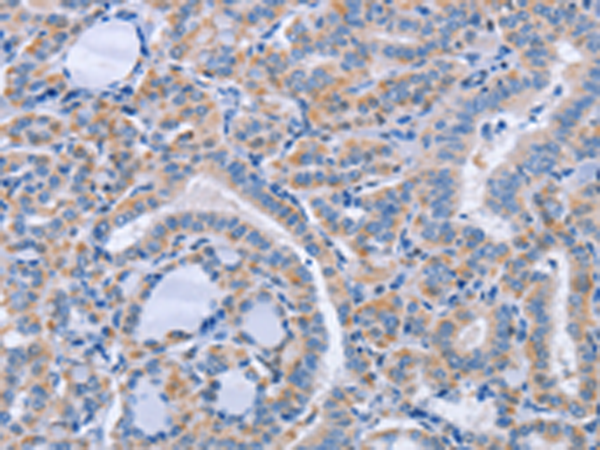

| WB | 咨询技术 | Human,Mouse,Rat |
| IF | 咨询技术 | Human,Mouse,Rat |
| IHC | 1/50-1/200 | Human,Mouse,Rat |
| ICC | 技术咨询 | Human,Mouse,Rat |
| FCM | 咨询技术 | Human,Mouse,Rat |
| Elisa | 1/2000-1/5000 | Human,Mouse,Rat |
| Aliases | FAT; GP4; GP3B; GPIV; CHDS7; PASIV; SCARB3; BDPLT10 |
| WB Predicted band size | 53 kDa |
| Host/Isotype | Rabbit IgG |
| Antibody Type | Primary antibody |
| Storage | Store at 4°C short term. Aliquot and store at -20°C long term. Avoid freeze/thaw cycles. |
| Species Reactivity | Human |
| Immunogen | Synthetic peptide of human CD36 |
| Formulation | Purified antibody in PBS with 0.05% sodium azide and 50% glycerol. |
+ +
以下是3篇与CD36抗体相关的代表性文献概览:
---
1. **标题**:CD36 mediates both cellular uptake of very long chain fatty acids and their transport into extracellular vesicles
**作者**:Svensson KJ, et al.
**摘要**:该研究利用抗CD36抗体阻断实验,揭示了CD36在细胞摄取超长链脂肪酸(VLCFA)及将其转运至细胞外囊泡中的双重作用,为脂质代谢异常相关疾病提供了新机制解释。
2. **标题**:Anti-CD36 antibodies in thrombotic disorders: Pathogenic role and therapeutic implications
**作者**:Yuan Y, et al.
**摘要**:文章系统分析了抗CD36抗体在血栓性疾病(如肝素诱导性血小板减少症)中的致病机制,提出靶向CD36-抗体相互作用的治疗策略可能改善临床预后。
3. **标题**:CD36-dependent regulation of toll-like receptor signaling in innate immunity
**作者**:Hoebe K, et al.
**摘要**:通过抗体介导的CD36功能抑制实验,证明CD36作为模式识别受体,通过与TLR2/6协同增强对病原体脂蛋白的识别,调控先天免疫应答的强度。
---
以上研究均通过抗体干预手段,分别从代谢调控、血栓病理和免疫信号传导三个维度揭示了CD36的生物学功能。如需具体文献年份或期刊信息,可进一步补充限定条件检索。
CD36 antibodies are tools used to study the CD36 glycoprotein, a cell membrane receptor belonging to the class B scavenger receptor family. CD36. also known as FAT (fatty acid translocase), is expressed on various cell types, including platelets, macrophages, endothelial cells, and adipocytes. It plays critical roles in lipid metabolism, cellular uptake of long-chain fatty acids, angiogenesis, inflammation, and innate immunity. CD36 also interacts with diverse ligands, such as oxidized low-density lipoproteins (oxLDL), thrombospondin-1. and pathogen-associated molecular patterns, linking it to atherosclerosis, metabolic disorders, and immune responses.
Antibodies targeting CD36 are essential for investigating its expression, localization, and function in physiological and pathological contexts. They enable techniques like flow cytometry, immunohistochemistry, and Western blotting to assess CD36 levels in tissues or cells. Dysregulation of CD36 is implicated in diseases like type 2 diabetes, cardiovascular diseases, and cancer, making these antibodies valuable for mechanistic studies and therapeutic exploration. Some CD36 antibodies block ligand binding, aiding in functional studies, while others serve as diagnostic markers for conditions like CD36 deficiency, a platelet disorder prevalent in certain populations. Research also explores CD36's role in tumor angiogenesis and metastasis, highlighting its therapeutic potential. However, variability in antibody specificity and cross-reactivity requires careful validation to ensure experimental accuracy. Overall, CD36 antibodies remain pivotal in unraveling the receptor's multifaceted biology and its clinical relevance.
×